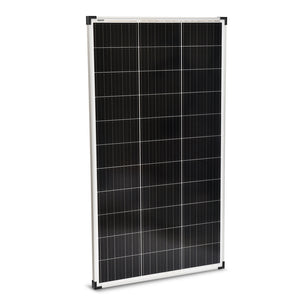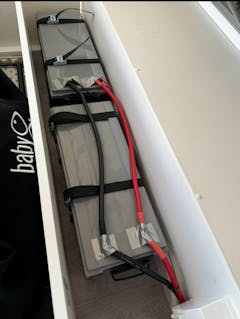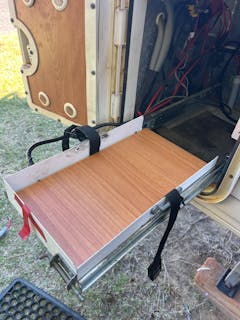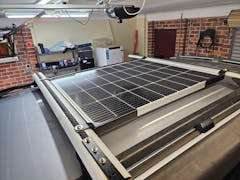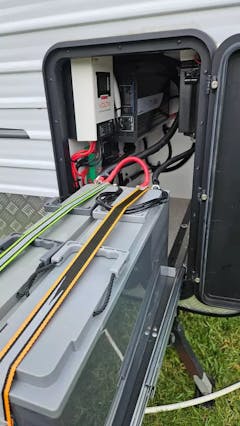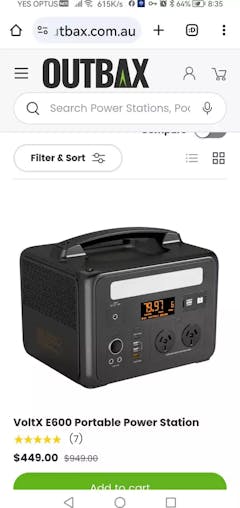Determining the right size solar panel to charge a 100Ah battery is crucial for anyone looking to set up a reliable off-grid power system in Australia. Whether you're planning weekend camping trips, extended caravan adventures, or establishing a small off-grid setup. Outbax's solar panels, such as the VoltX 12V 160W Fixed Solar Panel or the 200W Folding Solar Panel Kit, provide dependable solutions. This guide will help you navigate the technical aspects and make an informed decision tailored to your specific requirements.
Why Panel Size Matters for Your Battery
The wattage of your solar panel directly influences how quickly and efficiently you can charge your battery system. Selecting an undersized 100W solar panel might leave you with insufficient power, particularly during periods of limited sunlight, whilst a 200W panel could be an unnecessary expense and potentially require a larger, more costly charge controller. Finding the right balance is essential for anyone wondering what size solar panel to charge a 100Ah battery, as proper sizing ensures your system provides reliable power without wasting resources on excessive capacity that you'll never utilise.
Calculating Your Solar Panel Needs
Determining the appropriate solar panel size involves a straightforward calculation based on your battery's capacity and available sunlight. The basic formula is: Wattage needed = (Amp-hours × Voltage) ÷ Sunlight Hours. For a 100Ah 12V battery, you're looking at 1,200 watt-hours of energy storage (100Ah × 12V).
If your location receives approximately 5 hours of peak sunlight daily, you would theoretically need a 240W panel (1,200 ÷ 5) to fully charge from empty in one day. However, this calculation provides only a starting point, as several other factors affect real-world performance.
Factors Affecting Charging Time
The effectiveness of your solar setup depends on several variables beyond simple mathematics. Australia's diverse climate means peak sunlight hours vary significantly between Darwin and Melbourne. Panel efficiency, orientation angle, temperature fluctuations, and shading all influence charging performance. A north-facing panel tilted at the angle of your latitude generally captures optimal sunlight.
Additionally, high temperatures can reduce panel efficiency by up to 25%, whilst the type of charge controller used can significantly impact energy harvest. Understanding these elements is essential when determining what size solar panel to charge a 100Ah battery in Australian conditions.
Common Solar Panel Sizes for 100Ah Batteries
100W Solar Panel
-
100W Solar Panel: Ideal for basic setups with light energy demands, charging a 100Ah battery in about 12 peak sunlight hours. Best suited for weekend campers.
-
160W Solar Panel: A balanced option for moderate use, charging a 100Ah battery in approximately 7-8 hours. The VoltX 12V 160W Fixed Solar Panel is perfect for caravans and 4WD setups.
-
200W+ Panels: Excellent for users with higher daily energy needs, fully charging a 100Ah battery in 4-6 hours. The 200W Folding Solar Panel Kit offers portability and reliability for off-grid enthusiasts.
160W Solar Panel
For most recreational users, a 160W panel strikes an excellent balance between charging capability and practical considerations like cost and physical size. This panel can theoretically charge a 100Ah battery in approximately 7-8 hours of peak sunlight, making it suitable for weekend trips and moderate energy consumption. The VoltX 12V 160W Fixed Solar Panel available at Outbax represents an excellent option in this category, offering reliable performance for most camping and caravanning applications without excessive bulk or expense.
Larger Panels (200W+)
Panels of 200W or greater become necessary for those with higher daily energy demands or who require faster charging capabilities. These larger systems can potentially fully charge a 100Ah battery in 4-6 hours of good sunlight, making them ideal for travellers who run multiple appliances, need rapid recharging between cloudy periods, or use their system daily. The increased upfront investment typically pays dividends through improved reliability and performance for serious off-grid enthusiasts.
The Role of the Charge Controller
A quality charge controller forms an essential component of any solar charging system, protecting your battery from potentially damaging overcharging whilst optimising the charging process. The two primary types—PWM (Pulse Width Modulation) and MPPT (Maximum Power Point Tracking)—offer different efficiency levels and functionality. MPPT controllers typically harvest 15-30% more energy than PWM models, particularly valuable in Australia's variable light conditions. For instance, a 200W panel on a 12V system generates ~16.7 amps, so a controller rated for at least 20 amps is ideal. When sizing your controller, ensure it can handle your panel's maximum current output (usually panel wattage ÷ battery voltage) with some additional capacity for a safety margin.
Maintenance tips for long-term reliability
To ensure your solar charging system operates efficiently over the long term, it is important to follow a few maintenance practices. Regularly clean your panels with a soft, damp cloth to remove dust and debris, which can reduce output by up to 25%. Check all connections to ensure the wiring is secure and free of corrosion, and periodically inspect your charge controller and battery to confirm they are functioning within recommended parameters. When not in use, portable panels like the Folding Solar Panel Kit should be folded and stored in a dry, shaded location to prevent damage. Additionally, avoid exposing your system to extreme temperatures, as high heat can degrade both panel and battery efficiency over time.
Getting Started with Your Solar Setup
Selecting the right solar panel size ultimately depends on balancing your specific power requirements against practical considerations like budget, available space, and how quickly you need to recharge your 100Ah battery. For weekend warriors with basic needs, a 100W panel might suffice, whilst those requiring reliable daily power will benefit from 160W or larger systems.
Consider your typical usage patterns, geographical location within Australia, and seasonal variations in sunlight when making your decision. With the right setup, your solar system will provide years of reliable, sustainable power for your outdoor adventures or off-grid lifestyle.
At Outbax, we make it easy to get started with top-quality solar gear built for Aussie conditions. Explore our range of high-efficiency solar panels, batteries, and accessories—everything you need for a powerful, dependable setup. Shop now and take the first step toward energy independence.
For related articles: How To Choose The Best Solar Charger For Lithium Batteries
